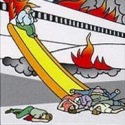|
It worked for the Manhattan project.
|
|
|
|

|
| # ? Jun 10, 2024 08:11 |
|
The problem with fusion as a power source is that every time we get to where we think we need to be, it turns out that we actually need an order of magnitude more power/precision/new technology/whatever or that previously unknown instabilities make it almost impossible with current technology. I really doubt we'll see fusion as a reliable power-producing design before 2100.
|
|
|
|
Sagebrush posted:It worked for the Manhattan project. Counter-point: Navy F35 Non joke answer: What if the government/DOE is actually fiscally responsible with grant money (wrt HUGE grants) and doesn't throw money at people unless they float new ideas that actually work? I'd much rather spend money on sensors that directly measure combustion temperature and pressure (as this provably moves the needle for turbine efficiency and reliability) than try to work some MIT guys idea that he hasnt published anything worthwhile on cause it doesnt loving work.
|
|
|
|
CarForumPoster posted:Counter-point: Navy F35 No that's loving retarded. With anything kind of research, there's always a risk that something is not going to pan out into something directly useful. That doesn't mean that the process of reaching that conclusion isn't useless in and of itself.
|
|
|
|
Sagebrush posted:It worked for the Manhattan project. The Manhattan project was primarily an engineering problem. They had the physics so well in-hand that they didn't even need to test the first bomb. It took a major industrial program to build the hardware to produce the fissile fuel, but they knew what they were trying to do before they did it. Fusion isn't just an engineering problem. It's a *materials* problem, and those are much bigger. Otherwise we'd have a space elevator by now.
|
|
|
|
MrChips posted:No that's loving retarded. No its common sense. In the case that you don't have a new angle that you can point to some reasonably validated model and say see this is how we will develop it, you're NOT going to get funding. This is true for large internal company R&D and it is true for government grants as well. People will fund moonshot projects if they have the budget and incentive but they won't do it without some risk reduction effort. No new science = no new funding.
|
|
|
|
Phanatic posted:The Manhattan project was primarily an engineering problem. They had the physics so well in-hand that they didn't even need to test the first bomb. It took a major industrial program to build the hardware to produce the fissile fuel, but they knew what they were trying to do before they did it. Engineering took the majority of the funding, but the physics were no so well in‐hand. They were inventing the physics as they went along. They understanding of the physics of fission at the beginning of the program was less than our understanding of the physics of fusion is now. We know plenty about how fusion works; it�s just that we have thus far been unable to make it energy‐positive.
|
|
|
|
And dumping more money into it is not necessarily a smart idea just because someone on the receiving end of that cash says so.
|
|
|
|
Platystemon posted:Engineering took the majority of the funding, but the physics were no so well in‐hand. Fusion power is 99% a materials problem at this point. The reason it isn't viable is that we need to find a chamber material that can survive an un-godly level of neutron flux for years on end and not transmute or otherwise lose its mechanical/thermal/electromagnetic properties. I heard from one of the JET researchers a few years ago that running net positive was easy (extracting the power in a usable form hadn't been done then though), but they were much more excited about running at a low power setting for a full 400 seconds before they needed to completely dismantle and strip out the core as it becomes highly radioactive and prone to failure under vacuum. They could run for 400s and then had to shut down for months to replace the chamber lining. Right now fusion power produces staggering amounts of solid nuclear waste to be disposed of - the chamber linings are not much more than single use and replacing/disposing of them is expensive, slow and difficult Captain Postal fucked around with this message at 01:31 on Jan 16, 2017 |
|
|
|
Platystemon posted:Engineering took the majority of the funding, but the physics were no so well in‐hand. The single trickiest thing they had to figure out was the implosion mechanism. Yes, they had to obtain capture cross-sections and empirically determine other parameters, but that was just grinding the work out. quote:We know plenty about how fusion works; it�s just that we have thus far been unable to make it energy‐positive. Other than that, Mrs. Lincoln, how did you like the play? Fusion is *really hard*. Even beyond being able to control the plasma, there's the little bit that over the lifetime of a commercial fusion reactor *every single atom* in the fusion vessel will experience 500-1000 displacements *per atom*. We have *no idea* if a material that can withstand that sort of neutron bombardment even exists. We certainly have no idea how to make one. Actually getting the fusion gain all the way to 20 might turn out to be the *easy* part of the process. Captain Postal posted:
So easy that nobody's actually done it! And for commercial power you'd need a fusion gain of 20. Personally I don't think that will ever happen. At best, it might find power applications in places where the economics of the plant aren't the primary concern (like with an RTG, we use those for power because they're suited to the applications we use them for, we don't produce commercial power with them). Phanatic fucked around with this message at 01:47 on Jan 16, 2017 |
|
|
|
The other thing is, even if there was more to learn about fission between 1940-'45, it didn't take nearly the material investment to do that research; they developed two working bomb designs with only blackboard math and one test to confirm the more complex design would actually work. With fusion, each new hurdle requires the construction of a bigger, more expensive reactor, just to try and solve the problem in question, or more likely find the next stumbling block. The total knowledge gain might be less, but the effort required to achieve it is astronomical.
|
|
|
|
Fusion energy is one of those projects that needs the whole world to sit down and have a Coke and a smile together, but fat loving chance of that happening, since the corporate entity/nation that 'cracks' ~the fusion problem~ will instantly become a hyperpower.
|
|
|
|
God drat I was just making a joke about Skunk Works getting neutered. Here's a B-36 with tank treads that was probably already posted in this thread because it was uploaded 6 years ago: https://www.youtube.com/watch?v=eDCgMlomhvM
|
|
|
|
In case anyone is confused as to why there's tracked landing gear on that aircraft, the original B-36 design had main landing gear consisting of one giant wheel on each strut which created so much ground pressure (or if not ground pressure, something else to do with runway length or composition) there were only three runways capable of supporting the aircraft including the field at the factory where they built the drat plane. One of the proposed fixes was breaking up the ground pressure with a fancy tracked system. The other one was just replacing that one giant tire with eight smaller ones.
|
|
|
|
Phanatic posted:Other than that, Mrs. Lincoln, how did you like the play? Our fusion reactors are not perfect, but they exist. When the Manhattan Project started, no one had demonstrated a fission reaction.
|
|
|
|
And the manhattan project, solving a much simpler problem, involved more or less all of the top physicists and chemists in the entire United States working for several straight years on nothing else with virtually unlimited resources.
|
|
|
|
Mortabis posted:And dumping more money into it is not necessarily a smart idea just because someone on the receiving end of that cash says so. And you are not going to NOT get fusion by avoiding dumping money into it. This is kind of counter-intuitive. Nearly ever major advancement we've made involved lots of money dumping into something that didn't really seem entirely feasible. Mortabis posted:And the manhattan project, solving a much simpler problem, involved more or less all of the top physicists and chemists in the entire United States working for several straight years on nothing else with virtually unlimited resources. And yet, somehow, even during the Manhattan project, we managed to invent things other than Nuclear Weapons alone. Considering the threat of Climate Change right now, we may end up needing a Manhattan project to save our species. But it won't happen, probably. Because we wouldn't want to dump money into science and engineering.
|
|
|
|
Platystemon posted:When the Manhattan Project started, no one had demonstrated a fission reaction. Strictly speaking, isn't any nuclear reactor a demonstration of a fission reaction? EDIT: I forgot the Chicago Pile is considered part of the Manhattan Project. Even so, the first successful U.S. fission reaction experiment happened in 1939. Vincent Van Goatse fucked around with this message at 03:25 on Jan 16, 2017 |
|
|
|
Vincent Van Goatse posted:Strictly speaking, isn't any nuclear reactor a demonstration of a fission reaction? Yes, but a net positive fission reaction is something we'd never done. The Germans actually did it first and Lisa Meitner and Otto Robert Frisch correctly described it first in while under refuge in Sweden. We achieved the first chain reaction fission.
|
|
|
|
Mortabis posted:And the manhattan project, solving a much simpler problem, involved more or less all of the top physicists and chemists in the entire United States working for several straight years on nothing else with virtually unlimited resources. Not to mention the motivation of trying to stop a world war.
|
|
|
|
Platystemon posted:Our fusion reactors are not perfect, but they exist. Given that you can build your own tabletop fusion reactor for a few hundred dollars in parts and it will merrily fusion and produce neutrons all day long, and such a reactor is roughly equally far away from commercially viable fusion power as ITER itself is, I'm not sure what your point is. Actually getting two deuterium nucleii to smack into each other and fuse is trivial. We have no fusion reactors that are even close to being commercially viable. A few years into the Manhattan Project we had actually useful industrial nuclear reactors. CommieGIR posted:And you are not going to NOT get fusion by avoiding dumping money into it. This is kind of counter-intuitive. Nearly ever major advancement we've made involved lots of money dumping into something that didn't really seem entirely feasible. The difference is that when we chose to dump a lot of money into the Manhattan Project, we knew with a certainty as near to totally certain as anything can be that we'd get nuclear reactors and nuclear bombs out of it at the end of the day. There is no such certainty, at all, with commercial fusion power.
|
|
|
|
We can't afford to not take a financial gamble on fusion power. Even if it means that we have to scrape He3 off of the surface of the moon to have a fuel that doesn't dump neutrons everywhere.
|
|
|
|
https://twitter.com/ktrk_kg/status/820838176986169344 https://twitter.com/francis82mafrit/status/820843977767260164 I'm phoneposting but holy poo poo that photo.
|
|
|
|
Anybody know what car that is in the last image here? http://zanoza.kg/doc/350851_pod_bishkekom_ypal_gryzovoy_samolet_turkish_airlines_foto.html
|
|
|
|
CommieGIR posted:And you are not going to NOT get fusion by avoiding dumping money into it. This is kind of counter-intuitive. Nearly ever major advancement we've made involved lots of money dumping into something that didn't really seem entirely feasible. This is very very not true. The opposite is true. James Watt didn't have a government grant for his steam engine. There was no government assistance for the Haber process. Etc. Materials science will improve incrementally over time, and if it ever reaches a point where we can produce a fusion reactor, then someone will build one. quote:And yet, somehow, even during the Manhattan project, we managed to invent things other than Nuclear Weapons alone. Considering the threat of Climate Change right now, we may end up needing a Manhattan project to save our species. But it won't happen, probably. We're not going to go extinct. quote:Because we wouldn't want to dump money into science and engineering. What is the right amount of money to put into science and engineering? How do we determine what that amount is? What I find so endlessly frustrating about the "more funding for science!" crowd is that nobody is ever able to articulate how much would be too much. There is science that shouldn't be funded. There must be. Mortabis fucked around with this message at 05:27 on Jan 16, 2017 |
|
|
|
Slo-Tek posted:Anybody know what car that is in the last image here? http://zanoza.kg/doc/350851_pod_bishkekom_ypal_gryzovoy_samolet_turkish_airlines_foto.html I'm guessing it's ~2004 Lexus ES330. Looks like an american spec model - it has a front amber reflector on the bumper. e: More likely Toyota Wisdom - steering wheel on RH side, sidemarker looks more like JDM model.  
0toShifty fucked around with this message at 05:42 on Jan 16, 2017 |
|
|
|
Phanatic posted:Given that you can build your own tabletop fusion reactor for a few hundred dollars in parts and it will merrily fusion and produce neutrons all day long, and such a reactor is roughly equally far away from commercially viable fusion power as ITER itself is, I'm not sure what your point is. Actually getting two deuterium nucleii to smack into each other and fuse is trivial. We have no fusion reactors that are even close to being commercially viable. My point isn�t that fusion research is easy or guaranteed to eventually succeed. My point is that neither was the Manhattan Project. The Manhattan Project is a terrible model, but I�m not the one who suggested it. Phanatic posted:The difference is that when we chose to dump a lot of money into the Manhattan Project, we knew with a certainty as near to totally certain as anything can be that we'd get nuclear reactors and nuclear bombs out of it at the end of the day. I�m going to have to disagree with you on that.
|
|
|
|
Hermsgervørden posted:https://twitter.com/ktrk_kg/status/820838176986169344 
|
|
|
|
I feel obliged to point out at this point that the B-29 project cost more money than the Manhattan Project, you be the judge which one was better value
|
|
|
|
MikeCrotch posted:I feel obliged to point out at this point that the B-29 project cost more money than the Manhattan Project, you be the judge which one was better value Allegedly true of the V‐weapons as well though I have trouble understanding how that is physically possible with the state of the German economy.
|
|
|
|
Mortabis posted:This is very very not true. The opposite is true. James Watt didn't have a government grant for his steam engine. There was no government assistance for the Haber process. Those are very small examples from a large number of examples where government funding directly drove R&D. And I really don't trust the free market to be providing our scientific advances alone, sorry. And fusion is a viable tech. Arguing that we shouldn't fund is and just let the free market take its course is laughable.
|
|
|
|
Mortabis posted:What is the right amount of money to put into science and engineering? How do we determine what that amount is? All of it. When engineers are wealthy enough to afford their project cars / other hobbies. </engineer> 
|
|
|
|
Platystemon posted:Allegedly true of the V‐weapons as well though I have trouble understanding how that is physically possible with the state of the German economy.
|
|
|
|
CommieGIR posted:Those are very small examples from a large number of examples where government funding directly drove R&D. Fusion (Pretend that every time I type 'fusion' I actually mean 'commercial fusion power') isn't a viable tech at all. At. All. Nobody has even achieved a fusion gain factor of 1. One plant did on a theoretical basis. Like, they calculated that if they'd been using D:T fuel instead of D:D fuel, they'd have hit Q=1, but that reactor couldn't operate with D:T fuel anyway. ITER has as its design goal the ability to operate with Q>1 for...several whole seconds. For a commercial fusion plant, you need a Q=20, and the ability to sustain the operation effectively indefinitely in the manner that fission plants operate. Then there are the aforementioned materials issues. The neutron flux from a fusion reactor is enormous, nothing we know of can withstand it for anywhere close to the lifetime of a commercial fusion plant. If you need to be replacing the entire reactor vessel every few years, then it's doubtful you can produce power at competitive rates even with a Q of infinity, where the plasma sustains itself without any extra energy inputs at all. The neutron flux is so high and so energetic that generating a neutron source that lets you investigate this regime is non-trivial, there's an entire other facility being built alongside ITER specifically to do that. And it is entirely possible that no suitable material exists. Saying fusion's viable is like saying a space elevator is viable: If we knew a material that would be suitable to build one out of, there's nothing stopping us from building one. This is a very potential *showstopper*. Things like actually extracting useful power from the reactor, breeding more tritium, etc, are mere engineering problems by comparison. Moreover, what is the compelling problem that fusion power solves? Reactor designs that can burn transuranics and thereby reduce waste already exist and are downright trivial to implement compared to a fusion plant, as are designs for subcritical accelerator-driven reactors that cannot melt down and never even involve a chain reaction. Fusion doesn't even eliminate the issue of disposing of nuclear waste; even the supposedly 'aneutronic' D:He3 fusion scheme still produces a bunch of neutrons via D:D side-reactions. And there are enough fissile/fertile fuels to last us tens of thousands of years if nuclear fission is *all* we used to produce power, which at the rate solar power becomes more and more viable isn't a realistic proposal. Given advanced fission plants for baseload and solar for most everything else, what is the *need* for fusion power? The Navy's been throwing some money at Bussard's polywell, which I'd love nothing more than to see succeed, but (a) if they've been having any success they're keeping it to themselves and (b) the Navy's focus isn't on economically producing power in the first place.
|
|
|
|
Nebakenezzer posted:
The Reichsmark was also funny money at that point so it's pretty hard to make direct comparisons about which one cost more. Just based on the amount of material and energy alone used in the Manhattan Project (something like 10% of the continental US power supply at one point) I don't think the Germans could come close to matching that. Phanatic posted:fusion words Everyone is missing the crucial point that even if fusion works, wait till you have your first accident at a fusion power plant and the population goes nuts. You can imagine the headlines along the lines of "MAD SCIENCE NEARLY TURNS TOWN INTO A SUN" being blared everywhere.
|
|
|
|
Phanatic posted:The Navy's been throwing some money at Bussard's polywell, which I'd love nothing more than to see succeed, but (a) if they've been having any success they're keeping it to themselves and (b) the Navy's focus isn't on economically producing power in the first place. B is a complete non-issue. A isn't terribly surprising if if they'd been having success (though I agree, they probably haven't done anything that significant anyway).
|
|
|
|
Godholio posted:B is a complete non-issue. What I mean by B is that the Navy's focus isn't the same thing as commercial fusion power. A naval fission reactor would never work as a civilian nuclear power plant, it'd be way too expensive and wouldn't be anywhere near competitive with existing power sources. But they build naval fission reactors anyway, because they work for the purpose they're intended for. Even if the Polywell turns out to be great for powering submarines, that doesn't mean it's got a wider range of applications.
|
|
|
|
MikeCrotch posted:Just based on the amount of material and energy alone used in the Manhattan Project (something like 10% of the continental US power supply at one point) I don't think the Germans could come close to matching that. This. Even had the Germans been handed Fat Man schematics in 1940 by a time traveller looking for a Red Alert reboot, they wouldn't have been able to spare the production capacity to produce the fissile material required. Add to that the risk that the western Allies will drop a few thousand tons of bombs on the facilities should they get wind of what's happening.
|
|
|
|
So, maybe this thread can help me? I'm in need of a dry sumped, injected motor making at least 60hp, able to run on JP-8 or Jet A, for a project I'm doing. Also it needs to be in current production and as light as possible. So far all I've really found is the Rotron RT600HFE rotary, which looks great but is a little low on power. Any other ideas?
|
|
|
|

|
| # ? Jun 10, 2024 08:11 |
|
Mr. Wiggles posted:So, maybe this thread can help me? I'm in need of a dry sumped, injected motor making at least 60hp, able to run on JP-8 or Jet A, for a project I'm doing. Also it needs to be in current production and as light as possible. So far all I've really found is the Rotron RT600HFE rotary, which looks great but is a little low on power. Any other ideas? Ultralight engines might be your deal. http://bushwhackerair.com/hksspecs.html
|
|
|































 Yes, it's like a lava lamp.
Yes, it's like a lava lamp.
